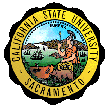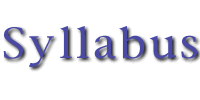
Henry Chambers
Office: Tahoe Hall, 3080, Department of History.
Office Hours:TTh 9-10: AM
Tues/Thurs 7:30-8:45 AM in Library 53
Broadcast on Cable Channel 71
email: hchamber@csus.edu
History 143B: Modern Middle East: 1800-2000
California State University, Sacramento

Fall, 2002
The course examines major Middle East conflicts in their historic contexts. Conflicts often seen as contemporary political disputes have deep historic roots. In this region created from the remains of the Ottoman Empire, states and societies still struggle to create an identity as well as free themselves from the colonial Western domination that followed World War II. At the same time they cope with the necessity of adapting to the demands of the modern world. The course selects several topics and countries to provide a focus for understanding the historical forces that drive the present states in the region.
Topics include: the Late Ottoman Empire's struggle to resist Western domination, Turkey's drive to establish a secular ethnically Turkish state and its accompanying ethnic atrocities, the Arab experience with colonialism and imperialism, the rise of Arab nationalism and Zionism, Persia's role as an outsider, but Islamic state, state and nation building, Islam and its several forms, Islamic renewal and its political effects, modernism and traditional societies, familial life and the Islamic/Arab woman, the Arab-Israeli conflict, and the Palestinian-Israeli struggle over Palestine.
The course will pay special attention to the Arab-Israeli conflict and the role of the United states in the region. Thus students will read a general history of the region, a specialized historical account of the Arab-Israeli conflict, an edited collection of essays on the diverse origins of the conflict that reflects contemporary historiography, and an historical monograph on the region.
- A knowledge of the regional variety of cultures and histories
- An understanding of the Palestinian-Israeli conflict as a complex struggle for the same land based on the most recent historical scholarship.
- An understanding of the forces of Western colonialism/imperialism, Arab nationalism, Zionism, and political Islam on the region.
- Students will analyze a monograph on a topic that intrigue them and write a five page paper on it..
- Students will hone their composition abilities.
|
Assignment |
|
|
|
Midterm Essay/Short Answer Exam |
25% |
October 22 |
|
Take Home Essay at Course Conclusion |
25% |
December 15 |
|
Paper I on Selected Monograph |
20% |
October 8 |
|
Paper II: Topic from Ilan Pappe's Readings: The Israel/Palestine Question |
15% |
November 19 |
|
Online Quizzes |
15% |
Various |
|
A |
90-100 |
|
|
B |
80-89 |
|
|
C |
70-79 |
|
|
D |
60-69 |
|
|
F |
0-59 |
|
Required:
1. William Cleveland. HISTORY OF THE MODERN MIDDLE EAST. 2d edition. Westview Press, 2000.
2. Charles D. Smith. PALESTINE AND THE ARAB-ISRAELI CONFLICT. 4th edition.. Bedford/St. Martin's Press, 2000.
3. Ilan Pappe. THE ISRAEL/PALESTINE QUESTION. Routledge, 1999.
4. A monograph selected from a course list or approved by the instructor. Available in the CSUS Bookstore will be: Mokrane Guezzou, RETURN OF THE PHARAOH; Syed Qutub, MILESTONES; John Esposito, UNHOLY WAR. TERROR IN THE NAME OF ISLAM, Oxford, 2002; and E. Rogan and Avi Schlaim (editors), THE WAR FOR PALESTINE, Cambridge, 2001.
|
Traditional Cultures and Islamic Foundations
|
Readings: Cleveland, MODERN MIDDLE EAST, pp 1-39; Smith, PALESTINE, pp. 1-17. |
Sept. 3-5. |
|
Arab Middle East Under Ottoman Rule
|
Readings: Cleveland, 40-101; Smith, 8-16. |
Sept. 10-12. |
|
Western Imperialism, Arab Nationalism, and Zionism
|
Readings: Cleveland, 102-145; Smith, 25-57. Pappe. pp. 1-48. Quiz # 1 online Sept. 19. |
Sept.17-19. |
|
WWI and the Dismemberment of the Ottoman Empire
|
Readings: Cleveland, 146-171; Smith, 58-108. |
Sept24-26. |
| Paper I on 19th and Early 20th Century Middle East Monograph |
|
Oct. 8. |
Turkey and Iran: Building Secular
States
|
Readings: Cleveland, 172-189, 267-292.
|
Oct. 1-3. |
|
Arab Struggle for Independence
|
Readings: Cleveland, 190-210 Quiz #2 online - Oct. 10. |
Oct.8-10 |
|
Arab Struggle for Independence to 45
|
Readings: Cleveland, 212-231. | Oct.15-17. |
|
Midterm Exam |
|
Oct. 22. |
|
Mandate Palestine
|
Readings: Cleveland, 233-266; Smith, 109-166. Pappe, Part II, pp. 53-95, 97-160. Quiz #3 - October 29 |
Oct 24-29. |
|
The 1948 Arab-Israeli War and After
|
Readings: Smith, 167-222. Pappe, 169-220. Quiz #4 - November 5. |
Oct 31-Nov 5. |
|
Nasser and Pan Arabism
|
Readings: Cleveland, 293-334; Smith, 223-277.
|
Nov. 7-12 |
|
Paper II on Ilan Pappe Text
|
Assigned topics. |
November 19 |
|
The 1967 War and the Radicalizaation of Arab Politics
|
Readings: Cleveland, 336-362; Smith, 278-300. Pappe, 221-243.
|
Nov. 14-19. |
|
War and the Search for Peace: Lebanon and the West Bank
|
Readings: Cleveland, 363-384; Smith, 301-405. Quiz #5 November 21 |
Nov. 21-26. |
|
Thanksgiving Holiday
|
|
Nov. 28. |
|
Secularism and Islam in the Arab World
|
Readings: Cleveland, 385-457. Quiz #6. Dec. 5. |
Dec. 3-5. |
|
A Region In Disorder or Transition: 1997-2002?
|
Readings: Cleveland, 458-525; Smith, 406-516. Pappe, 247-266. |
Dec. 10-12.
|
Take Home Essay Composition Due Friday of Exam Week - DECEMBER 20
Assignments:
Each student will prepare two papers, 4-5 pages in length. One on a monograph of the student's choice from the four available in the bookstore, on the instructor's bibliography, or one approved by the instructor. The second paper will be an analysis of one the topics from Ilan Pappe's edited collection of essays.
Six online ten question quizes will be available throughout the term, taken within WebCt. Each quiz can be retaken a second time with the highest grade posted. The five highest quiz grades will count toward the course grade.
A Distance and Distributed Education Survey is available for students to take for extra credit at term's conclusion. http://www.csus.edu/surveys/de.htm
The course will have a midterm essay and short answer exam. Study questions will be provided . No comprehensive exam will be given. Rather a take home essay 8-10 pages in length is due Friday of exam week on a topic provided by the instructor. All papers should contain all ements of smooth English composition, with introductions, conclusions, proper paragraph construction, topic sentences, consistent verb tenses, and complex sentence structures worthy of a college graduate.
